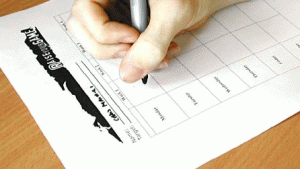Once you’ve set your goals, the next thing you need is a plan for how you’re going to achieve them. The plan will be a series of activities set against a time line. These activities could be training rides, weights sessions, periods of rest, and so on – we’ll discuss more about specific activities in later articles. This article gives some general advice on planning.

A simple plan with days down the side and weeks along the top. Write in what you’re going to do each day (e.g. club run, interval session, recovery ride, rest, etc)
First – write your plan down. A plan that only exists in your head is a vague and ephemeral thing, a bit like a goal that’s not time bounded. If you’re serious about reaching your goals, take the time to work through the plan, and write it down. This could take the form of a big sheet of paper on the shed wall, or a diary – whatever works best for you.
For each activity in the plan, don’t just say what you are going to do – also understand why you are doing it. Are you trying to build strength or stamina? Are you training hard, or tapering off towards a big event? Are you on a recovery ride or a hard session? Understanding why you are doing something, as well as what it is, will help make your activities more successful.

There are lots of products available to help you create your training plan, and record your progress against it.
Keep a training diary, where you record what you actually did. If you planned a hard session with 10 intervals but you only managed 6, write that down. Equally, if a session was easier than expected, record that too. Also keep a record of how you felt and any periods of sickness. Recording things like resting heart beat (when you wake up on the morning) and a general well being rating each day can be really useful.
At least once a month, review your plan and your training diary. If you are coping well with training, are generally feeling good, and your resting heart beat is falling – happy days, your plan is going well! If you generally feel tired, you’re getting more colds and ‘flu, and you’re struggling to complete your training sessions, then these are all signs that you need to ease up, and maybe take a break.
Don’t be afraid to adapt your plan. Learn what works well for you, and what doesn’t, and update your plan in light of this. Cycling is all about learning about yourself.
Before looking at specific types of training, the next article looks at two general principles that underpin any training plan – progression and cycles.
